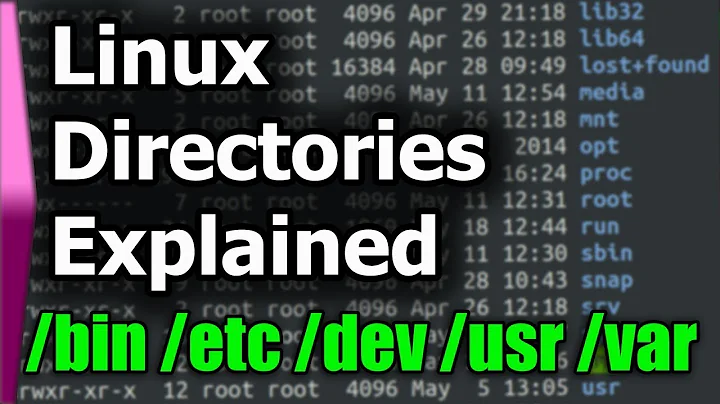Filesystem compatible with GNU/Linux and Mac
25,315
Solution 1
You probably want the ExFAT filesystem. Works on OSX, Linux and Windows. Supports large volume and file sizes. Here is some information How to enable exFAT in Ubuntu on exFAT support in Linux.
Solution 2
The default OS X filesystem, HFS+, works in Linux. But first, see:
http://en.wikipedia.org/wiki/HFS_Plus#Linux
Related videos on Youtube
Author by
bad_coder
Updated on September 18, 2022Comments
-
 bad_coder over 1 year
bad_coder over 1 yearWhich filesystem is compatible with GNU/Linux and Mac OS? I want to be able to read/write from both GNU/Linux and Mac OS. For example I want to copy a file to my external hard-drive from GNU/Linux and then copy it from the external hard-drive to Mac OS.
I know FAT works but I want it to support files bigger than 4GB.
-
 Admin over 11 yearsAre you sure you don't just want to use
Admin over 11 yearsAre you sure you don't just want to usescpto copy via the network? Would be much easier, I would have thought. -
 Admin over 11 yearsnever considered that. didn't even hear about scp :-/ i'll do some research
Admin over 11 yearsnever considered that. didn't even hear about scp :-/ i'll do some research -
 Admin over 11 yearsIt's a relative to ssh (secure shell - secure remote login), and is very useful to copy files from one linux/unix type machine to another. scp uses the same infrastructure as ssh, to log in to the other machine and then copy the file content over. It's fairly efficient as long as machines are connected with a goog (gigabit) network, and with a long piece of wet string... :)
Admin over 11 yearsIt's a relative to ssh (secure shell - secure remote login), and is very useful to copy files from one linux/unix type machine to another. scp uses the same infrastructure as ssh, to log in to the other machine and then copy the file content over. It's fairly efficient as long as machines are connected with a goog (gigabit) network, and with a long piece of wet string... :) -
Kallaste over 2 yearsIf you want to use an external drive, I would most definitely NOT use exfat on MacOS. Use a journaled filesystem like HFS instead. Exfat on MacOS's has some terrible quirks, such forced fsck_exfat checks on dirty volumes with no warning and not even any indicator that it's running. Exfat isn't journaled, so if the drive ever unmounts uncleanly, MacOS will force a recheck, which can take many hours. There is literally no way to bypass this, since the dirty bit needs to be flipped to clean before MacOS will let you write to it again. There are other reasons, but this is enough in my opinion.
-
-
 Admin over 11 yearsI have read on wiki about ExFAT that "As of 2009, an experimental, open-source Linux kernel module that supports the reading of exFAT files is currently under development. A FUSE-based implementation with read/write support is available for Linux as well. None of the solutions can become an official part of Linux due to the patent encumbered status of the exFAT filesystem." Is it ok to use exfat?
Admin over 11 yearsI have read on wiki about ExFAT that "As of 2009, an experimental, open-source Linux kernel module that supports the reading of exFAT files is currently under development. A FUSE-based implementation with read/write support is available for Linux as well. None of the solutions can become an official part of Linux due to the patent encumbered status of the exFAT filesystem." Is it ok to use exfat? -
marcus erronius over 11 yearsYes, it is... They reverse-engineered the exFAT driver. I just edited the answer to provide a useful link
-
 Dariusz Filipiak about 8 yearsif you have lots of small files on your ExFAT... they are taking lots of space.. to much!
Dariusz Filipiak about 8 yearsif you have lots of small files on your ExFAT... they are taking lots of space.. to much! -
marcus erronius almost 8 years@DariuszFilipiak not really true. FAT16 and FAT32 had certain limits that made files on very large volumes take up too much space. exFAT changed those limits enough that it'll be decades before we even get close to that.
-
 Dariusz Filipiak almost 8 yearsI actually solved problem with big size of files on exFAT by setting small allocation unit size.
Dariusz Filipiak almost 8 yearsI actually solved problem with big size of files on exFAT by setting small allocation unit size. -
Hayden almost 5 yearsThis is great if all you want to do is share files and you still want to be able to share with Windows too but if you want to maintain linux permissions then exFAT doesn't work.
-
marcus erronius almost 5 years@Hayden: Interesting... It preserves Unix permissions on my Mac, so I just assumed it would on Linux as well. However, if you're only doing this for a sneakernet file copy, you might not be worried about permissions.
-
jdg about 4 yearsNote that exFAT does not support symbolic links, which was a problem for me.




